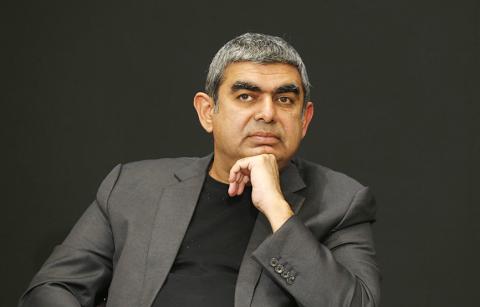Vishal Sikka has resigned as chief executive of Infosys Ltd, the Indian software giant announced yesterday, amid growing acrimony between the company’s board and its founders.
Sikka said the “increasingly personal” attacks had hit morale at the company, which has been trying to keep pace with rapid changes in the industry.
“Over the last many months and quarters, we have all been besieged by false, baseless, malicious and increasingly personal attacks,” he said in a statement.

Photo: AP
“The distractions that we have seen, the constant drumbeat of the same issues over and over again, while ignoring and undermining the good work that has been done, take the excitement and passion out of this amazing journey,” he said.
Infosys shares fell by more than 7 percent after the surprise announcement.
Sikka had come under fire in recent months from some of the founders of the company on issues related to corporate governance and salary increases for its top executives.
He said he would stay on temporarily as executive vice chairman to ensure a “smooth transition.”
Chief operating officer UB Pravin Rao is to take over as interim chief executive.
Analysts said Sikka had helped steer Infosys back on track and his resignation reflected badly on the company.
“Sikka’s letter indicates there was a directed attack on him leading to his resignation, which again makes the company look bad for investors,” information technology analyst Baburajan Kizhakedath said.
“It is a tough time for Infosys in the market and the board couldn’t handle investors, media or its own warring factions,” he added.
Another analyst said the sudden move could make it difficult for Infosys to recruit a permanent successor to the role.
Sikka was the first Infosys chief executive who was not one of the company’s founders.
He is based in the US, where the company earns nearly two-thirds of its revenue.
India became a back office to the world in the early 2000s as companies subcontracted work to companies such as Infosys, taking advantage of the nation’s skilled English-speaking workforce.
The US$150 billion information technology sector remains one of the nation’s flagship industries, but it is facing upheaval in the face of automation and US President Donald Trump’s clampdown on visas.
The National Association of Software and Services Companies recently called on companies to teach employees new skills after claims they had failed to keep up with new technologies.
Last month Infosys reported an increase of 1.4 percent in consolidated net profit year-on-year for the first quarter, marginally beating analysts’ expectations.
The company’s board said it understood Sikka’s reasons for resigning and regretted his decision.
It said criticism of the management team had “harmed employee morale and contributed to the loss of the company’s valued CEO.”

SEEKING CLARITY: Washington should not adopt measures that create uncertainties for ‘existing semiconductor investments,’ TSMC said referring to its US$165 billion in the US Taiwan Semiconductor Manufacturing Co (TSMC, 台積電) told the US that any future tariffs on Taiwanese semiconductors could reduce demand for chips and derail its pledge to increase its investment in Arizona. “New import restrictions could jeopardize current US leadership in the competitive technology industry and create uncertainties for many committed semiconductor capital projects in the US, including TSMC Arizona’s significant investment plan in Phoenix,” the chipmaker wrote in a letter to the US Department of Commerce. TSMC issued the warning in response to a solicitation for comments by the department on a possible tariff on semiconductor imports by US President Donald Trump’s

The government has launched a three-pronged strategy to attract local and international talent, aiming to position Taiwan as a new global hub following Nvidia Corp’s announcement that it has chosen Taipei as the site of its Taiwan headquarters. Nvidia cofounder and CEO Jensen Huang (黃仁勳) on Monday last week announced during his keynote speech at the Computex trade show in Taipei that the Nvidia Constellation, the company’s planned Taiwan headquarters, would be located in the Beitou-Shilin Technology Park (北投士林科技園區) in Taipei. Huang’s decision to establish a base in Taiwan is “primarily due to Taiwan’s talent pool and its strength in the semiconductor

An earnings report from semiconductor giant and artificial intelligence (AI) bellwether Nvidia Corp takes center stage for Wall Street this week, as stocks hit a speed bump of worries over US federal deficits driving up Treasury yields. US equities pulled back last week after a torrid rally, as investors turned their attention to tax and spending legislation poised to swell the US government’s US$36 trillion in debt. Long-dated US Treasury yields rose amid the fiscal worries, with the 30-year yield topping 5 percent and hitting its highest level since late 2023. Stocks were dealt another blow on Friday when US President Donald

UNCERTAINTY: Investors remain worried that trade negotiations with Washington could go poorly, given Trump’s inconsistency on tariffs in his second term, experts said The consumer confidence index this month fell for a ninth consecutive month to its lowest level in 13 months, as global trade uncertainties and tariff risks cloud Taiwan’s economic outlook, a survey released yesterday by National Central University found. The biggest decline came from the timing for stock investments, which plunged 11.82 points to 26.82, underscoring bleak investor confidence, it said. “Although the TAIEX reclaimed the 21,000-point mark after the US and China agreed to bury the hatchet for 90 days, investors remain worried that the situation would turn sour later,” said Dachrahn Wu (吳大任), director of the university’s Research Center for